As eco conscious living reshapes home design, green pool construction is revolutionizing backyard luxury. Homeowners now prioritize eco friendly pool design that merges sustainability with style, opting for sustainable pool materials like recycled glass tiles and permeable decking. Modern energy efficient pool systems, from solar powered heating to variable-speed pumps, slash energy use by up to 80% while maintaining crystal clear water.
Beyond cost savings, these choices foster healthier swimming environments with low chemical pool maintenance and natural pool filtration. Whether you’re drawn to water saving pool technology or solar innovations, this guide unveils how to create a stunning oasis that respects the planet and your wallet. Dive in!
1. Benefits of Green Pool Construction: Sustainability Meets Smart Living
Choosing green pool construction isn’t just an eco-friendly gesture it’s a strategic investment that delivers tangible rewards for your family, finances, and the planet. Below, we break down the four key advantages of opting for eco friendly pool design, from shrinking your environmental footprint to boosting your home’s market appeal.
1. Reduced Environmental Footprint
Traditional pools guzzle water, energy, and chemicals, but sustainable pool materials and systems rewrite this narrative. For example:
- Water Conservation: Covering your pool reduces evaporation by 70%, while water saving pool technology like rainwater harvesting systems can offset refill needs.
- Lower Chemical Use: Natural filtration methods (…, bio pools with aquatic plants) or saltwater systems cut chlorine dependency by up to 90%, reducing toxic runoff.
- Energy Efficiency: Solar powered pool heating and variable-speed pumps slash energy consumption by 50–80% compared to conventional gas heaters and single speed pumps.
By prioritizing recycled building materials like glass tiles or reclaimed stone, you also minimize resource extraction and landfill waste.
2. Healthier Swimming for All
Harsh chemicals like chlorine can irritate skin, eyes, and lungs, especially for children and pets. Green pool construction embraces gentler alternatives:
- Saltwater Systems: Generate natural sanitizers without the strong odor or dryness of traditional chlorine.
- Ozone/UV Purification: These systems neutralize bacteria and algae using minimal chemicals.
- Non-Toxic Liners: Phthalate free materials prevent harmful leaching into the water.
The result? A safer, more enjoyable swimming environment that’s kinder to wildlife and local ecosystems.
3. Long-Term Savings
While green pool construction may cost 10, 20% more upfront, the long term savings are compelling:
- Energy Bills: Solar heaters and LED lighting reduce monthly utility costs by 30, 50%. A variable speed pump alone saves $800+ annually.
- Maintenance: Low chemical pool maintenance means fewer purchases of chlorine or algaecides. Natural pools with plant filtration require almost no additives.
- Durability: Recycled glass tiles and natural stone outlast traditional plaster, reducing repair costs over time.
Many regions also offer incentives, such as tax credits for solar installations or rebates for ENERGY STAR certified equipment, accelerating your return on investment.
4. Increased Property Value
Eco conscious homebuyers are willing to pay a premium for sustainable features. A study by the National Association of Realtors found that energy efficient pool systems and eco friendly pool design can boost property values by 3, 5%. Highlighting certifications like LEED or solar-ready infrastructure further enhances appeal.
Ready to transform your pool into a sustainable oasis? Explore our free estimate service to discover tailored solutions for your Georgia home.
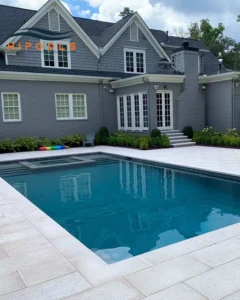
Energy Efficient Pool Systems: Slash Costs and Carbon Footprint
Modern energy efficient pool systems are the backbone of green pool construction, offering significant savings while reducing environmental harm. Here’s how these innovations work:
Solar Pool Heaters
By installing solar thermal panels, you harness free sunlight to warm pool water, eliminating reliance on gas or electric heaters. These panels, often mounted on rooftops or ground racks, circulate water through sun-heated tubes, cutting energy use by up to 80%. In sunny regions like Georgia, solar systems extend swimming seasons by 2, 3 months without fossil fuels.
Variable Speed Pumps
Unlike single-speed pumps that run at full power constantly, variable-speed models adjust flow rates to match your pool’s needs. This reduces energy consumption by 80%, saving homeowners $800+ annually. They’re also quieter and extend the lifespan of filters and heaters.
LED Lighting
Swapping traditional bulbs for LED lights slashes energy use by 75% and lasts 5x longer (up to 50,000 hours). With customizable colors and smart controls, LEDs add ambiance without the guilt.
Smart Controllers
Wi Fi enabled devices like Pentair Intelli Connect or Hayward Omni Logic automate heating, filtration, and lighting. By optimizing schedules based on weather and usage, they prevent energy waste and ensure peak efficiency.
Note Tip: Pair solar heaters with a pool cover to retain heat and maximize savings.
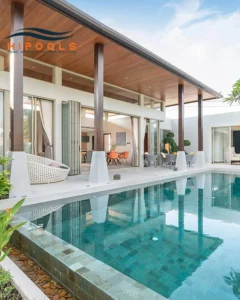
Natural Filtration & Chemical Free Maintenance: Pure Water, Naturally
Ditch harsh chemicals with low chemical pool maintenance systems that prioritize health and sustainability:
Saltwater Systems
Saltwater pools generate chlorine naturally through electrolysis, reducing reliance on synthetic chemicals. The result is gentler water that’s easier on skin, eyes, and swimsuits ideal for families and pets.
Plant Based Filtration (Bio Pools)
Bio-pools mimic natural ecosystems, using aquatic plants (like water lilies) and gravel beds to filter water. Microbes in the gravel break down contaminants, while plants absorb nutrients, creating a self sustaining system. These chemical free pools attract wildlife like frogs and dragonflies, blending seamlessly into eco friendly landscapes.
Ozone or UV Systems
- Ozone Generators: Inject ozone gas (O₃) to oxidize bacteria and viruses, reducing chlorine needs by 90%.
- UV Sterilizers: Use ultraviolet light to destroy pathogens, ensuring clean water with minimal chemicals.
Both methods enhance water clarity and safety while slashing chemical costs by $200, $500 yearly.
Why It Matters:
- Healthier Swimming: No red eyes, itchy skin, or chemical odors.
- Eco Friendly: Zero toxic runoff into local waterways.
- Low Maintenance: Bio pools require seasonal plant care instead of weekly chemical balancing.
Cost of Green Pool Construction: What to Expect
While green pool construction offers undeniable environmental and financial benefits, understanding the costs is key to making an informed decision. Below, we break down the upfront investment, long-term savings, and incentives that make sustainable pools a smart choice for eco-conscious homeowners.
Upfront Costs: 10, 20% Higher, But Worth the Premium
Eco-friendly pools typically cost 10, 20% more than traditional designs due to advanced materials and technologies. Here’s why:
- Sustainable Materials: Recycled glass tiles, natural stone, and permeable decking often carry higher price tags but offer durability and low environmental impact.
- Energy-Efficient Systems: Solar heaters ($3,000, $9,000), variable-speed pumps ($800, $1,500), and LED lighting ($100, $300 per fixture) add to initial costs but deliver long term savings.
- Specialized Labor: Installing bio filtration systems or integrating smart controllers may require certified technicians.
For example, a traditional $50,000 pool might cost $55,000, $60,000 as a green build. However, incentives and savings quickly offset this gap.
Long-Term Savings: Payback in 3, 8 Years
Green pools are designed to save money over time:
- Energy Savings: Solar heaters cut heating costs by 50, 80%, while variable-speed pumps reduce energy use by 80%, saving $800+ annually.
- Lower Maintenance: Saltwater or ozone systems slash chemical costs by $200, $500 year. Bio pools eliminate chemicals entirely after setup.
- Durability: Recycled glass tiles last 20+ years vs. 10, 15 years for traditional plaster, reducing resurfacing expenses.
A $6,000 solar heater saving $750 year pays for itself in 8 years, while a $1,200 variable-speed pump saving $800/year recoups costs in 1.5 years. Combined, these features often deliver a full payback within 3, 8 years.
Incentives: Tax Credits, Rebates, and Grants
Governments and utilities reward sustainable choices:
- Federal Tax Credits: Claim 30% of solar heater costs (…, $2,700 back on a $9,000 system).
- State Rebates: Georgia offers $100–$500 for ENERGY STAR certified pumps or covers 25% of rainwater harvesting systems.
- Utility Discounts: Some providers offer $200, $1,000 for installing energy efficient equipment.
These incentives can reduce net costs by 15, 30%, accelerating your return on investment.
While green pool construction requires a higher initial investment, the blend of long-term savings, environmental benefits, and financial incentives makes it a financially savvy choice. For Georgia homeowners, pairing solar heating with water saving tech and bio filtration can transform your pool into a self sustaining oasis.
Note Tip: Work with a certified installer to maximize incentives and design a system tailored to your budget. Request a free estimate to explore cost effective, eco friendly solutions today!
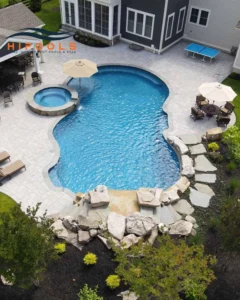
Environmental Impact of Green Pools: Protect Nature While You Swim
Opting for green pool construction isn’t just about personal enjoyment it’s a powerful way to safeguard ecosystems, conserve resources, and combat climate change. Below, we explore how eco-friendly pools reduce water waste, slash carbon emissions, and even support local wildlife.
1. Water Conservation: Preserve a Precious Resource
Traditional pools lose thousands of gallons annually to evaporation and backwashing. Green pool construction tackles this waste with innovative solutions:
- Pool Covers: Reduce evaporation by 70%, saving up to 15,000 gallons yearly for an average sized pool.
- Rainwater Harvesting: Collect and filter rainwater to refill your pool, cutting reliance on municipal supplies.
- Permeable Decking: Materials like gravel or porous concrete allow rainwater to replenish groundwater instead of flooding drains.
By integrating water saving pool technology, you shrink your household’s water footprint while combating drought risks in regions like Georgia.
2. Carbon Reduction: Fight Climate Change
Conventional gas heaters emit 5, 10 tons of CO2 annually per pool equivalent to driving 12,000 miles. Green pools eliminate this harm:
- Solar-Powered Heating: By replacing gas heaters with solar thermal panels, a single pool prevents 5+ tons of CO2 emissions yearly equal to planting 120 trees.
- Energy-Efficient Systems: Pairing solar with LED lighting and variable-speed pumps can reduce a pool’s carbon footprint by 80–90%.
Over a 20-year lifespan, a solar-heated pool avoids 100+ tons of CO2, making it a cornerstone of eco-conscious living.
3. Habitat Support: Create a Wildlife Sanctuary
Natural pool filtration systems, like bio-pools, do more than clean water they foster biodiversity:
- Pollinator Havens: Aquatic plants (…, water lilies, cattails) attract dragonflies, bees, and butterflies, supporting local ecosystems.
- Amphibian Habitats: Frogs and salamanders thrive in chemical free water, controlling pests like mosquitoes naturally.
- BirdFriendly Design: Shallow edges or rock gardens provide drinking spots for birds, enhancing your backyard’s ecological value.
Unlike sterile traditional pools, these eco friendly pool designs transform your space into a thriving micro-habitat.
Why It Matters
- Global Impact: If 10% of U.S. pools switched to solar heating, CO2 emissions would drop by 1.2 million tons annually equal to taking 260,000 cars off roads.
- Local Benefits: Reduced chemical runoff protects rivers and lakes, while permeable decking prevents urban flooding.
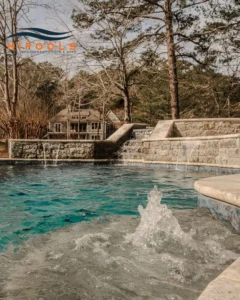
The Bottom Line
Choosing green pool construction isn’t just a trend it’s a commitment to a healthier planet and a smarter way to enjoy your backyard oasis. By opting for eco friendly pool design, you slash energy bills with solar powered heating, reduce chemical dependency through natural pool filtration, and conserve water with innovative sustainable pool materials. These choices not only protect Georgia’s ecosystems but also elevate your swimming experience, offering gentler water for families and a habitat for local wildlife.
While upfront costs may be slightly higher, long term savings from energy efficient systems and incentives like 30% federal tax credits ensure your investment pays off. Plus, eco conscious features like permeable decking or bio pools boost your property’s appeal in a competitive market.
Ready to dive into sustainability? Request a free estimate today to explore tailored green pool construction options that align with your budget and values. Together, let’s create a backyard retreat that’s as kind to the Earth as it is inviting for your next swim.
Your pool can be a force for good build it green, and swim with purpose.

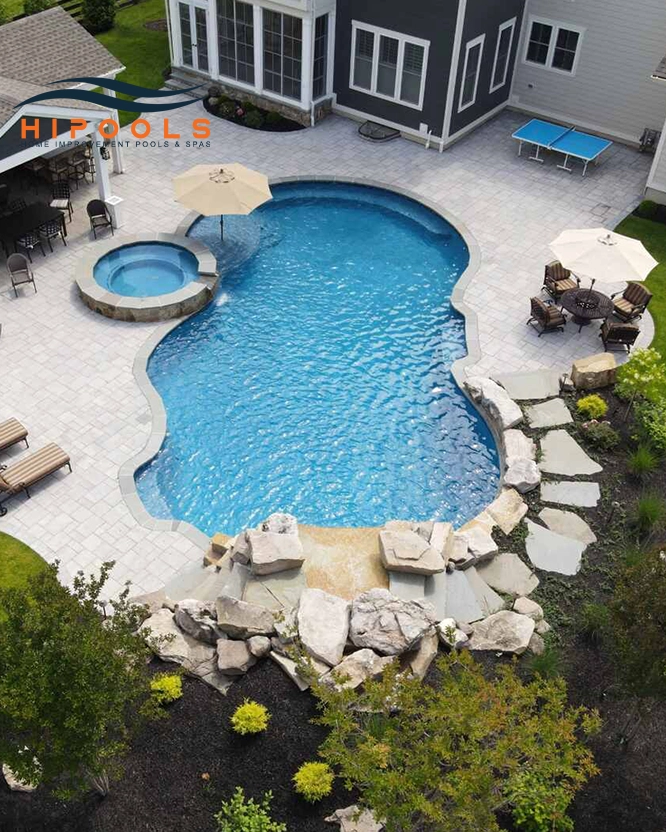
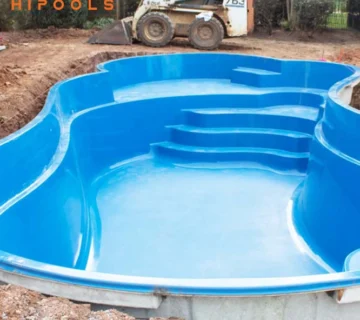
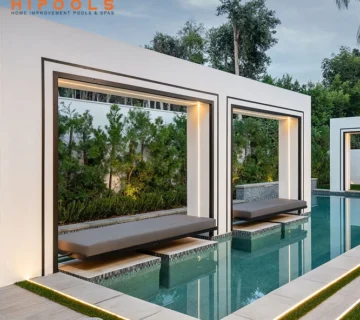
No comment